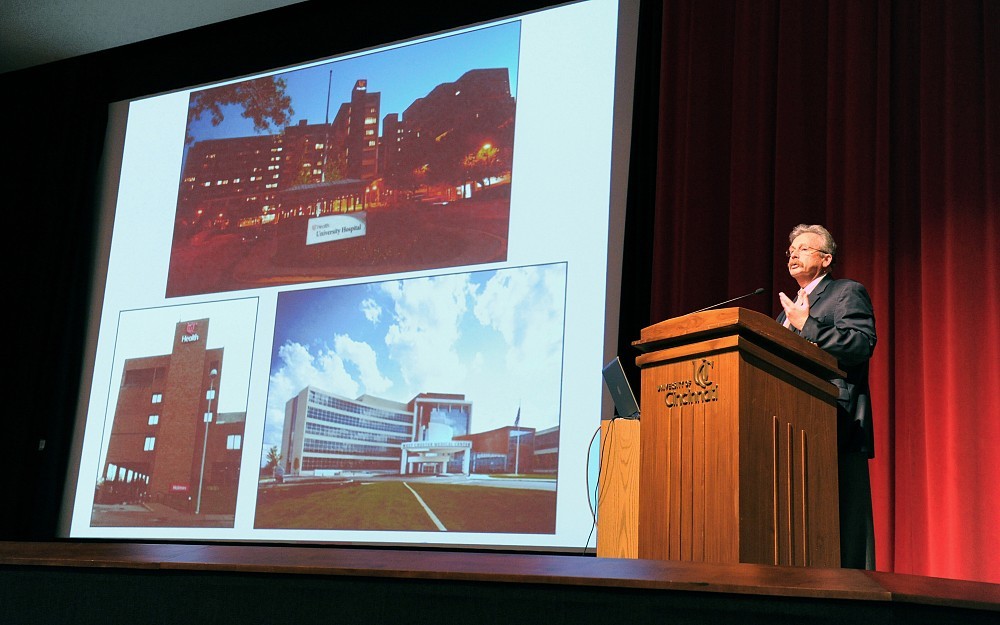
Accountability, Transparency Key Themes in New UC Clinical Model
Action is the foundational key to success. The triumphor failureof the UC clinical enterprise hinges equally on strict alignment of goals and priorities across the College of Medicine, UC Physicians and UC Health and a culture of personal accountability and collegiality among employees.
This was the message delivered by Myles Pensak, MD, senior associate dean of clinical affairs at the College of Medicine, to faculty and staff Monday, April 30, 2012, as he presented "Clinical Practice at UC: A Sisyphean Task?
Pensak elicited laughs when he drew parallels between the challenges of practicing clinical medicine at UC and the story of Sisyphus, a king in Greek mythology who was condemned to spend eternity pushing a boulder to the top of the mountain only for it to roll back down once he reached the pinnacle.
"There is no question that we have a lot of challenges, many of those challenges involving change thrust upon us by outside sources. No one likes changeit goes against human naturebut heres the bottom line: If we dont take control of our own environment, someone else will, said Pensak. "Now is the time to come together as an organization and embrace a culture of accountability and integrity, from the senior-most leadership down.
Culture Shift
Pensak stressed the importance of shifting from a culture that is "quick to judge and slow to praise to one that celebrates both collective and individual successes, lifting up high achievers and maximizing the efforts of employees who recognize the value of transformational change at all levels of the UC clinical practice.
Trust and pride in the organization, however, cannot be forced nor occur overnight, he said.
"Its not about NIH funding, skill sets in the operating room or passion; its about integrity and the ability to have confidence and trust in the people you work with and the organization, said Pensak. "That momentum starts with a transparent leadership team that communicates often and honestly and listens and addresses employee concerns. The fewer disengaged, disenfranchised employees we have in the organization, the healthier and more successful we will be. This change is real and its time for everyone to embrace it.
Customer-Centric
Now 18 months into UC Health integration, Pensak says the clinical practice is driven by a customer-focused mindsetwhether the customers are patients, physicians or staff.
"We must empower employees at all levels to respond to challenges with enthusiasm and creativity. Organizations that are laden with hard and fast rules stifle ingenuity and progress becomes paralyzed, he said. "We must make a conscious effort to lift up high achievers who are committed to the transformational change we need as a health system to not only provide the best health care possible, but also make this a rewarding place to work.
He reinforced leaderships commitment to clarifying paths for top-level decision-makinga frustration he says many clinicians have voiced to himand enabling employees to take day-to-day actions that improve the patient experience.
"As a system, we provide care to more than 1.4 million patients annually. I see that as 1.4 million individual opportunities to give patients, families and their referring physicians a positive impression of UC. Each and every one of us has the responsibility to make that happen. Perception is reality and we all must aggressively work internally to build employee pride and show the community what an asset this health system is to our region, added Pensak.
» A video and PowerPoint of Pensaks presentation is available in the "Dean's Corner" section of the College of Medicine website.
Related Stories
Is ketamine the answer to treatment-resistant depression?
May 16, 2024
The University of Cincinnati's Stephen Rush joined WVXU's Cincinnati Edition to discuss the use of ketamine and esketamine to treat treatment-resistant depression.
UC study: Severe ischemic strokes rare in total patient...
May 15, 2024
The University of Cincinnati’s Yasmin Aziz will present research at the European Stroke Organisation Conference that found severe ischemic strokes with the most severe damage are rare in the total stroke patient population.
Increasing syphilis cases highlight treatment barriers across...
May 14, 2024
The University of Cincinnati's Carl Fichtenbaum spoke with the Cincinnati Enquirer about a recent report that found Hamilton County syphilis cases reached a six-year high in 2023.
